Is Alchemist the world’s most extreme restaurant?
A meal at Alchemist costs as much as a mortgage repayment and some diners even walk out, distressed by its confrontational approach. So how come this Danish chef has two Michelin stars and a 10,000 person waiting list?
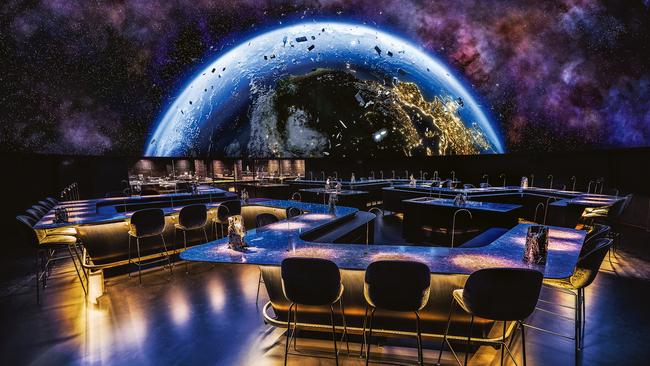
It’s a freezing Tuesday night in Copenhagen, and I’m chasing a bodysuit-clad woman around a mirrored room while a booming voice asks, “Who are you, really?” over the speaker. So begins dinner at Alchemist, the two-Michelin-starred behemoth ranked fifth best restaurant in the world.
This is part restaurant, part lab, theatre and soapbox, and my 50 “impressions” (that’s Alchemist for “courses”) go on to include freeze-dried butterfly, lamb’s brain served in a custom-made “head” featuring real human eyebrows, and a caged chicken claw served while 3D images of fowl are projected overhead on the domed ceiling. Four hours later, and after the same bodysuited woman has burst out from a ball pit as Freedom! ’90 by George Michael blares, I am released into the snowy Danish night amused and a little gastrically confused, although certainly clearer on why a tabloid dubbed this place “the weirdest restaurant in the world”.
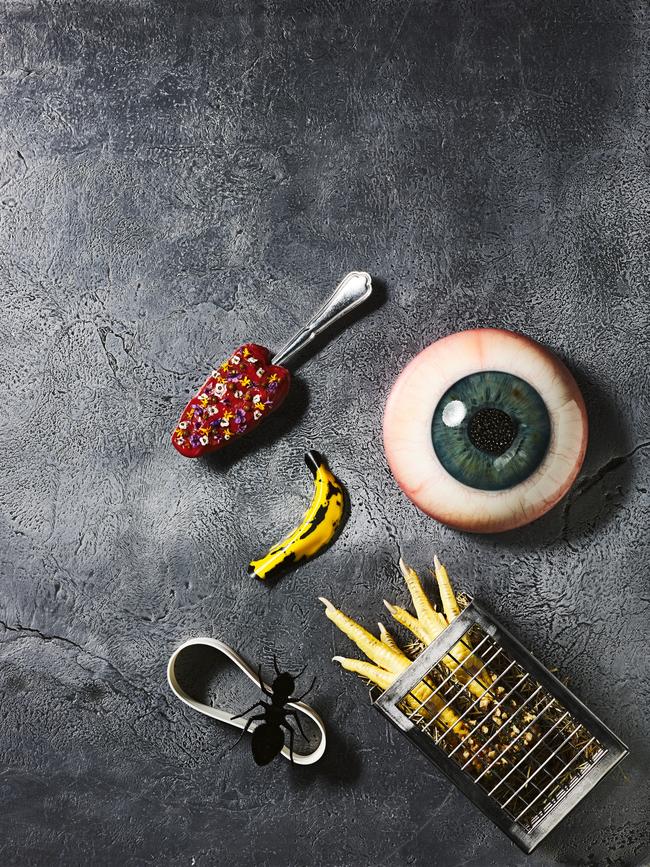
Alchemist, where a meal costs about $1080 per head – or $2960 with the most expensive wine pairing – is the work of millennial provocateur Rasmus Munk, who appeared on the UK’s MasterChef: The Professionals in late 2023 when the three finalists worked a service in his restaurant and were introduced to a “larder” of chicken blood, pig windpipes, lambs’ brains, fish eyes and cows’ udders. Little wonder some viewers compared the episode to a scene from The Silence of the Lambs.
On his website, the 32-year-old chef promises that his dishes will “create a new understanding of the world order” capable of “transcending time and space”. He makes clear that his aim is not simply to feed each night’s 52 guests (or the 10,000 more on the waiting list), but rather to use this 2230-square-metre former shipping warehouse “to change the world”. “That’s been the ambition with Alchemist from the start,” he tells me later. “How can you use that platform to push as many agendas as possible?”
Short answer: by challenging diners on every front and with every course. Each dish seems to have been conceived to push a particular button. Earlier creations of Munk’s have included an ashtray inspired by his grandmother’s death from lung cancer (actually a carcinogenic-looking dish of potato, onion and bacon), and a funnel through which diners are fed “ethical” foie gras. My plaice dish is shrouded in edible “plastic” made from algae and fish skin collagen to highlight the detritus in our seas, and pig and deer blood ice-cream comes with a QR code linking to a blood donation site. Caviar-topped lobster tartare is served inside an “eye” based on the chef’s own, a nod to the fact “Big Brother is always watching”. A chocolate bar served in the final gasps of this culinary marathon comes with a spiel from the smiley waitress about the horrors of child labour in Africa, with more information on the subject printed on the back of the wrapper.
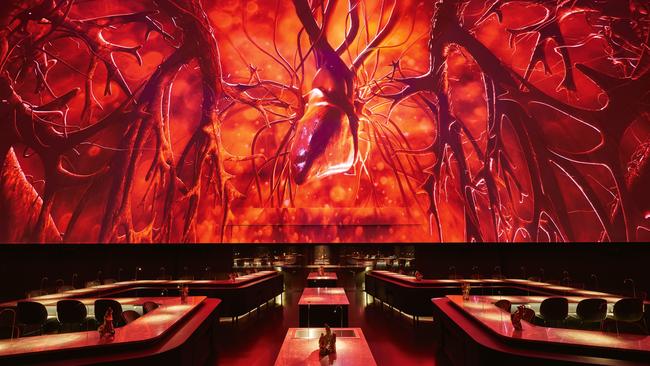
On paper, it is the kind of experience you’d pay not to be put through, but mindful of the price tag, I resolve to consume everything laid in front of me. Many of the dishes disappear in a lick or a puff, so I find myself devouring the more substantial ones. The “Plastic Fantastic” plaice goes down well, as do a frozen meringue made with tonic water and fat-washed sea buckthorn vodka, and a reconstituted crab claw. But I falter at the arrival of “The Tongue Kiss”, a striped concoction on a silicone tongue, the waitress disappearing with the words, “We’ll discuss the ingredients later”. It sounds like a threat and after a few sour licks, I accept defeat, disappointed to learn afterwards that it is a comparatively innocuous combination of peppers and anchovy.
Is dining here the best food you’ll ever eat? Probably not, but I find myself curiously swept along by the playfulness of it all. It’s also much less pretentious than it sounds, even if it is punchy to highlight ethical and social inequalities in surround sound during a meal that probably costs as much as the average diner’s monthly mortgage payment.
This story is from the April issue of WISH to be published in The Australian on Friday, April 5.
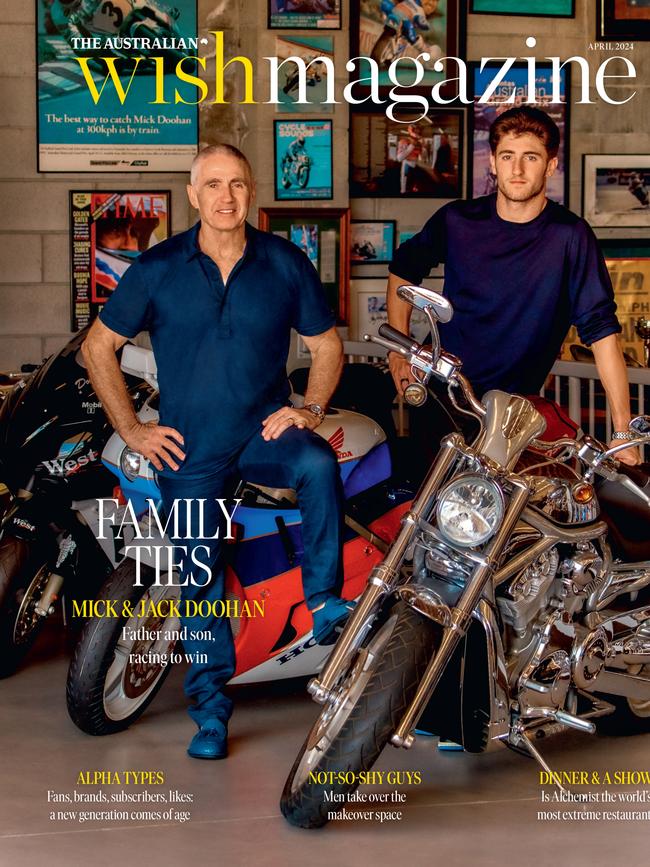
Inevitably, not everyone enjoys the experience. Munk has had five walkouts (the chicken dish, designed to raise awareness of battery farming, being the most common trigger) and plenty of tears, and he regularly sees groups sitting in angry silence before they reach the end of the meal. Dining alone means I’m limited in whom to pick a fight with, but I can’t help feel that halving the number of issues (and indeed courses) might prove more effective. One article summed it up less charitably, accusing Alchemist of being “hellbent on making a statement, though what kind of statement isn’t exactly clear”.
I’m pleased to find Munk significantly less strident, diffident almost, in person when we meet after dinner beneath the fungus-shaped lights on the restaurant balcony. He’s all in black, the trade’s requisite tattoos on his forearms, yet comes across more baby-faced Ed Sheeran lookalike than social justice warrior. While admitting he enjoys causing ructions, Munk says he doesn’t set out to provoke just for the sake of provoking. He’ll make substitutions for those struggling with some of the more outlandish dishes (swapping raspberry ice cream for the pig’s blood, for example), and when diners really kick off, the staff and then Munk himself will intervene. “We try to calm them down if they’re very angry,” he says, “try to defend what we are doing.”
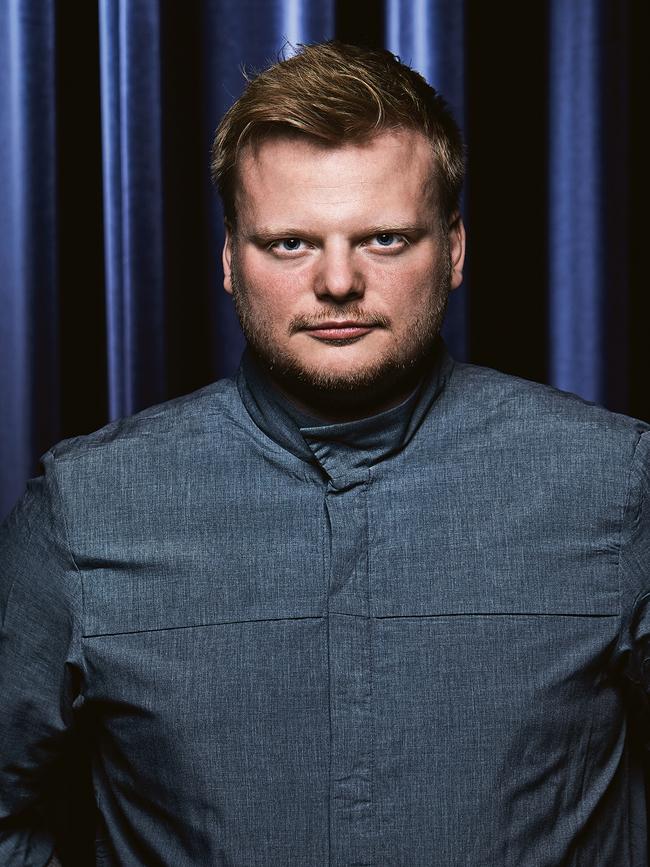
It’s hard to identify the nascent activist – or indeed chef – in Munk’s youth. He grew up on a farm in Randers, Jutland, three and a half hours from Copenhagen. There was no gastronomic culture to speak of at home – his mum can’t cook, he says, and his dining experiences extended only to a weekly trip to McDonald’s – but at 18, needing to make some cash, he was convinced by a friend to train as a chef. It made sense to Munk who, as a boy, had always loved pulling apart his bikes and putting them back together; this way of getting under the skin of things. After working in kitchens in London for a few years, and stints at The Fat Duck and Noma, he quickly became a head chef on his return to Denmark in his early twenties – before quitting a job he could do “with one hand behind my back” to enact his own vision.
This would not be a paean to the Noma-inspired world he had grown bored with; all foraged herbs and picture-perfect dishes on neutrally toned plates. Instead, he wanted to produce a more meaningful menu, with a relevance beyond the confines of the restaurant walls. “At the start I thought it was just about food,” he says, “but my drive now is to create a legacy that is more than just Michelin stars.” Yes, he wants a third star, but also, he sheepishly admits, “a Nobel Peace Prize”. No one can fault his ambition.
The first iteration of Alchemist in 2015 – which Munk fitted out himself – had 15 seats. He closed it down to open today’s version, less than 20 minutes’ walk from Noma. Those early months triggered a whirlwind of plaudits – he made Michelin history by earning two stars within seven months of opening and the international media fawned over his “provocatively boundary-pushing and prodigiously kooky” work. “It should have been like a fairytale,” he says of that time. “But honestly, I think it was one of the worst periods of my life.”
Munk, then 28, would often drive home in tears, overwhelmed by the feeling that his feet “never touched the ground, and [I] never had time to breathe. Suddenly, I was not in control of anything and it was crazy”.
“I don’t see myself as a very confident person,” he adds. For all his single-mindedness, he admits that negative comments on social media get him down, and he’s constantly questioning himself. “We start the dream, but at the same time, I question everything. ‘How do we do this? Will this ever be a success?’.”
Covid shutdowns less than a year after opening appeared, paradoxically, to help. The enforced break allowed some time to recalibrate and cook for the homeless (Munk does a lot of charity work). Yet a few years on, he finds his mind veering back into unsettled territory. “What is the next experience? What is the next station? This kind of mad circus and endless loop of work is quite?” he trails off. “I feel it can easily kill off creativity.”
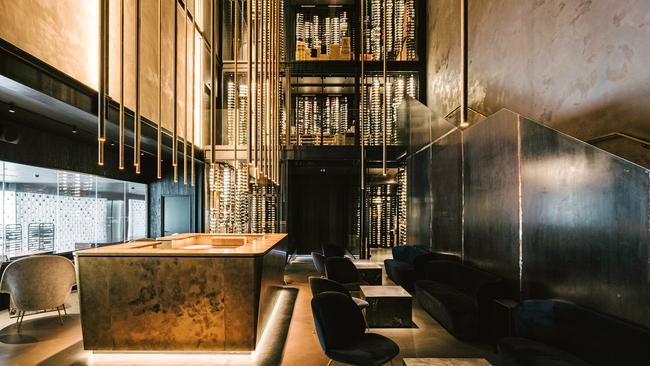
Still he pushes on, in search of something bigger, better, stranger. Earlier this year he staged a pop-up with Ferran Adrià, the molecular gastronomy pioneer behind Spain’s El Bulli, swiftly followed by a Super Bowl event in Las Vegas. He is designing the menu for a children’s hospital in Denmark, while his newest lab enterprise, Spora, has recently graduated from Alchemist’s test kitchen to a $2.5 million site where he will develop a sustainable man-made protein, initially for dinner service and, he hopes, commercially.
Control remains Munk’s greatest internal struggle. Alchemist does not open if he’s not there; he knows the working of every element, from the lifts to the sound system to the iPad drinks menu. One moment he is perfecting 3D-printed bananas at the pass, the next he is kneeling beside diners serving cocktail shots in custom-made gold daisies. It must be exhausting, but he finds being here five nights a week is less stressful than delegating and sitting at home. “It’s about prioritising,” he reasons, perhaps more to himself than to me. He talks of maybe trading it all in for a family with his girlfriend of seven years, front of house manager Lykke, but until then, “I have this as my baby”.
For all the toil, the spoils are apparently few. “It costs a lot to run a restaurant like this,” Munk says. “We’re not earning anything.” There are more than 100 staff to pay, including chefs and waiters who have to sit exams to ensure they have mastered the changing menus. There’s a visual effects artist, a composer, a glass blower, tea sommelier and actors hired as human art installations. They also recently employed the services of a mentalist, to experiment with dinnertime mind games. “If the place were not full every night, it would be a disaster financially,” he acknowledges, but he says his “holistic dining” mission “is more important than the financial outcome”.
Munk is certain that Alchemist has a shelf life, though it’s hard to imagine him handing over the reins. It might not be to a chef, he says, but to a movie director or a dramatist, to push the restaurant in directions new. “Am I the best to do that? I don’t think so, actually.”
More time off the hamster wheel might allow him to reach new levels of audacity, he thinks. He almost chastises himself for the experience being so traditional as to include amuse-bouches and drinks, dinner and petits fours. (No matter that it also involves the lift being transformed into an art installation, ant-filled candy and a gluten puff that emits a waft of smoke on first bite.) “I want to push the envelope,” he says. “In some ways, we are not. We could be bolder.”
Everything once seemed doable, if he just put in all the hours God sent. But now, “I’m getting more anxious. Is this mission so big that I will never achieve it? I feel for the first time that I’m running out of time.”




To join the conversation, please log in. Don't have an account? Register
Join the conversation, you are commenting as Logout